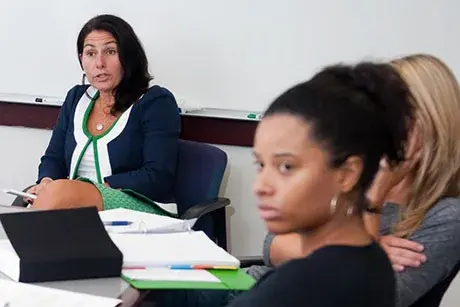Center of the Storm: RWU Law and DACA
Professor Deborah Gonzalez, Director of the Immigration Law Clinic at RWU Law, on Trump's rescinding of DACA -- and what happens now.

When President Trump announced in early September that he was putting an end to DACA – the Deferred Action for Childhood Arrivals program, which granted temporary deportation relief and work authorization to some 800,000 eligible individuals brought to the United States as undocumented immigrants at a young age – he unwittingly sparked a focused resistance among immigration advocates that never existed before.
In Rhode Island – home to more than 1,200 DACA recipients (known as “DREAMers”) – the center of this resistance is Roger Williams
“Before this president was elected, there were at least 40 immigration coalitions in the state, all of them working separately,” said Deborah Gonzalez, Director of the Immigration Law Clinic and Associate Clinical Professor of Law at RWU Law. “Then he revoked DACA, and in no time we were all working together – on policy; on rapid response in the event [U.S. Immigration and Customs Enforcement (ICE)] raids begin happening here …”
It began in the immediate wake of Trump’s decision, when Gonzales delivered a fiery speech at a protest rally at the Rhode Island State House, organized by the Coalition of Advocates for Student Opportunities (CASO). “I was pretty worked up,” Gonzalez admitted with a smile. “I was really mad about all of [U.S. Attorney General Jeff] Sessions’ lies about the program.”
Among other things, Gonzales told the crowd that DREAMers had until October 5 to file the necessary paperwork to renew their participation in DACA and called upon Rhode Islanders to raise the $495 renewal fee required of each participant. Rhode Island Governor Gina Raimondo – who was present at the rally – promised to make that happen.
“Do not despair. We are doing what we can and we will continue to work to protect you.”
Raimondo quickly pulled together “a coalition of individuals and organizations” who collectively donated more than $170,000 to cover the renewal fee for every DREAMer in Rhode Island. (No funding came from the state.)
“We’re not going to allow $495 to stand in the way of our neighbors’ dreams,” Raimondo told reporters a few days later. “Now is the time to fight for our values and take action against hatred and bigotry.”
“Rhode Island was founded on the principles of tolerance and diversity,” Raimondo added in a statement. “Those values mean nothing if we abandon them in times of difficulty. DREAMers are in our schools in every community. They are Rhode Islanders. As long as I am Governor, Rhode Island will stand with DREAMers and DACA recipients.”
In addition to the money for renewal applications, the governor announced that a handful of local organizations – many directly associated with RWU Law, and partially staffed by RWU Law students and interns – would coordinate outreach and services, including pro bono legal representation and assistance filing DACA renewal applications. These providers included:
- the Immigration Clinic at RWU Law;
- the Pro Bono Collaborative at RWU Law;
- the Rhode Island Center for Justice, housed at RWU Law’s Providence campus;
- Dorcas International Institute (formerly International Institute), where Gonzalez has served as a subcommittee chair since 2010;
- Progreso Latino; and
- the aforementioned Coalition of Advocates for Student Opportunities (CASO)
“A lot of people came to me and said, ‘I don’t know, Debbie. Why should I trust this administration? For all I know that are going to rip the rug from under me and they’re going to undo my DACA?’” Gonzalez recalled of those frantic weeks between Trump’s announcement and the renewal deadline. “My answer to that was: ‘Maybe. We really don’t know what this administration is going to do; there’s no way of knowing.’ But I highly recommended that [those] eligible for DACA renew. I said, ‘Don’t be afraid because you may think the government is going to take your information and use it for something else. Rest assured that the administration has promised, as of today, from what we know, that your DACA will not be revoked.’”
Once the October 5 renewal deadline passed, Gonzales immediately went back to work advocating for driver’s licenses for undocumented residents, including ex-DREAMers – who are now losing their employment status, and therefore their eligibility for a Social Security number (required for a driver’s license); considerably complicating life for thousands of gainfully employed persons who simply need to commute to their places of employment.
Meanwhile, her advice is erstwhile DREAMers remains hopeful: “Do not despair,” she said. “Know that there is a coalition of advocates who are here to help you. We are doing what we can and we will continue to work to help protect you. Please go see a reputable immigration attorney or a Board of Immigration Appeals-accredited representative, so you can find out whether or not there is any other form of immigration benefit or relief you may be eligible for. You’ll never know that unless you go see somebody.”
